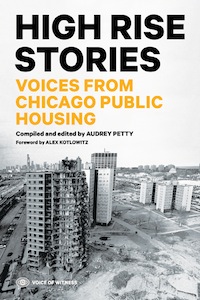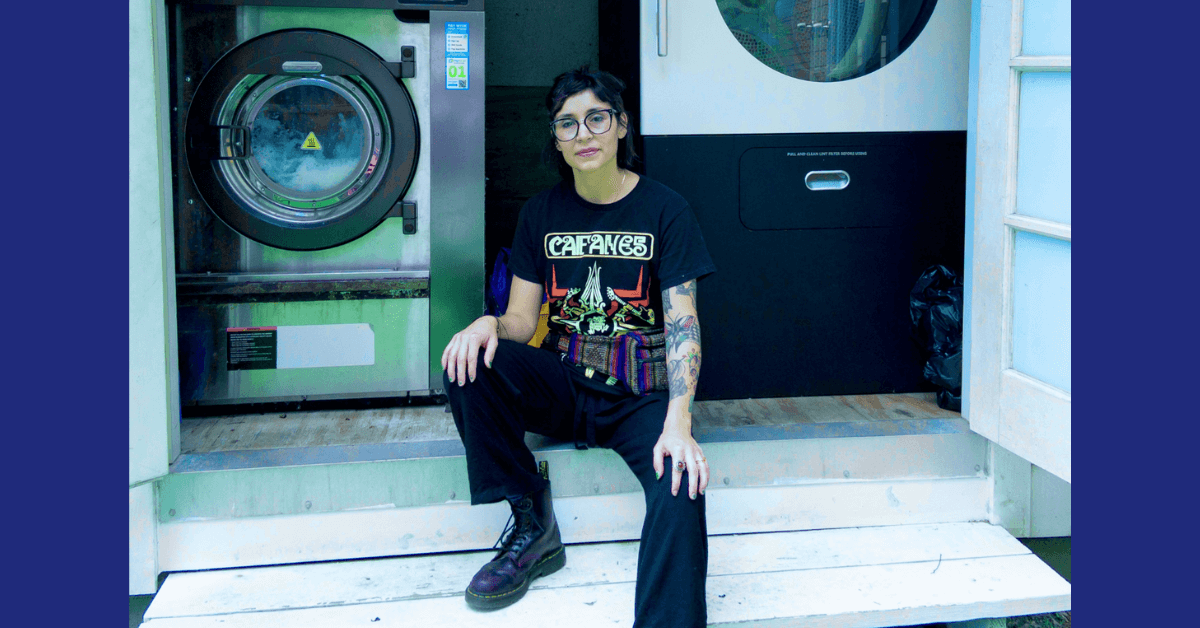During Black History Month, Voice of Witness is highlighting High Rise Stories: Voices from Chicago Public Housing, an oral history book in our series.

In the gripping first-person accounts of High Rise Stories, former residents of Chicago’s iconic public housing projects describe life in the now-demolished high rises. These stories of community, displacement, and survival in the wake of gentrification amplify the experiences of Black narrators marginalized by and resisting against ongoing systems of oppression.
The book features 12 narratives, including oral histories from:
DOLORES, who, at the age of 82, was hastily displaced from her home in Cabrini-Green after 53 years and forced to leave many of her belongings behind. Dolores depicts her community’s evolution over five decades, including her leadership in resident government and her husband’s mentoring of youth through a Drum and Bugle Corps.
SABRINA, whose sister was shot in the head in their Cabrini-Green apartment when she was caught in the middle of a turf-related shooting. Because ambulances refused to come to Cabrini-Green, and the elevators were out of order, Sabrina’s father and her then-pregnant mother had to carry her sister down thirteen flights of stairs to rush her to the hospital.
CHANDRA, whose son’s felony conviction bars him from entering the grounds of Chandra’s home in Orchard Park. Chicago Housing Authority rules demand that Chandra report him to the police if she sees him on the property, or face eviction herself.

The book was edited by writer and educator Audrey Petty, who grew up in Chicago’s South Side. Audrey’s work has been published in African American Review, Saveur, ColorLines, Poetry, The Southern Review, and more, and she has taught extensively in the fields of African American literature and creative writing. Audrey currently directs the Sojourner Scholars Program at Illinois Humanities and is a member of the Prison + Neighborhood Arts/Education Project.
The Chicago high rises described in the book were among the largest public housing complexes in the United States and home to predominantly Black communities. Defunded by city, state, and federal governments over the course of the 1970s forward, high rise public housing was chronically neglected and mismanaged and many were ultimately torn down as part of redevelopment projects.
As editor Audrey Petty writes:
As a result of the Plan for Transformation, city government has demolished or rebuilt twenty-five thousand public housing units and simultaneously relocated tens of thousands of people. And nothing is settled. For many outsiders, the disappeared buildings of Chicago public housing are too often considered in purely symbolic terms, with former residents easily categorized as troublemakers or victims. The truths of the matter belie such facile conclusions. The narrators of High Rise Stories describe the promise, the failure, and the success of the high rises…Some express their relief at having moved away. Others describe their fear of what comes next. Each and every one expresses the myriad ways they invested in their communities.
The oral histories highlight decades of racial injustice and the lack of dignity afforded to people in public housing, as well as the deeply rooted sense of joy, family, and community that feature in the recollections of many of the narrators.
You can order High Rise Stories here and access the corresponding free lesson plans.
Hear what thought-leaders are saying about this collection:
The high-rise public housing projects of Chicago have long carried their own myths…But families, actual people lived in those buildings. In this volume, we get to hear their stories. As a whole, the collection is gripping, and nuanced and unexpectedly moving.
Roxane Gay, author
High Rise Stories is essential reading for anyone interested in fair housing.
Van Jones, political commentator and author
This invaluable book will help its readers get beyond stereotypes and pat answers to grapple with the paradoxes these places represented and the complex humanity of the people who lived there.
The Chicago Tribune
A powerful and authentic work. High Rise Stories captures the vibrant sense of community and home, as well as the challenges, that existed for those who lived in Chicago’s public housing developments, through a series of searing first person narratives. An important book and a very moving read.
Dave Isay, founder of StoryCorps




